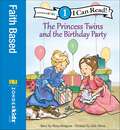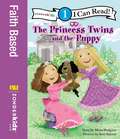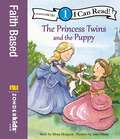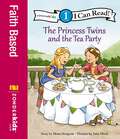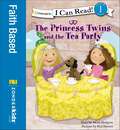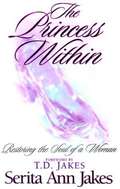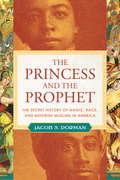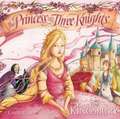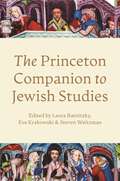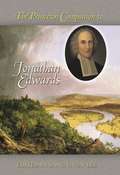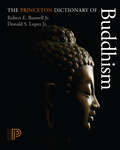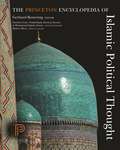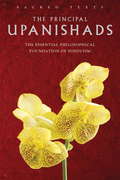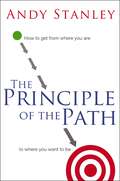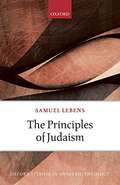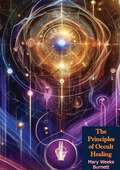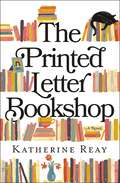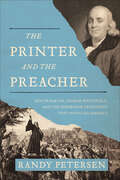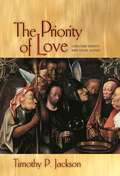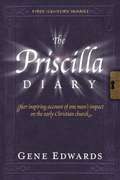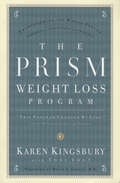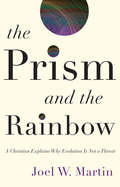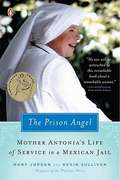- Table View
- List View
The Princess Twins and the Birthday Party: Level 1 (Princess Twins #Level 1)
by Mona HodgsonA Lesson in KindnessPrincesses Abby and Emma are ready to celebrate their birthday with their friends. But where did Beth go? Can Emma convince Beth to come back to the party?This is a Level One I Can Read! book, which means it&’s perfect for children learning to sound out words and sentences. It aligns with guided reading level G and will be of interest to children Pre-K to 3rd grade.
The Princess Twins and the Puppy: Level 1 (I Can Read! #Level 1)
by Mona HodgsonIn this level-one story, Princess Abby shoos away their Puppy at tea time, but when she tries to find the pup at play time, the pup is gone. Princess Emma helps her search, but Abby is on her own when she has to go into the dark cellar to rescue the stuck puppy. Abby prays for Jesus to be with her as she bravely steps down the dark steps. This level-one story teaches girls what it means to be a princess for the true King. A lesson in trusting in Jesus when you are afraid.
The Princess Twins and the Puppy: Level 1 (I Can Read! / Princess Twins Series)
by Mona HodgsonA Lesson in Trusting GodSend out a search party for Puppy! Abby hears him in the basement, but it is so dark down there. Is Abby brave enough to rescue her friend, Puppy?This is a Level One I Can Read! book, which means it&’s perfect for children learning to sound out words and sentences. It aligns with guided reading level G and will be of interest to children Pre-K to 3rd grade.
The Princess Twins and the Tea Party: Level 1 (I Can Read! / Princess Twins Series)
by Mona HodgsonA Lesson in HumilityPrincess Emma wants the spring tea party to be perfect, even when Princess Abby reminds her that only God is perfect. And just when the guests arrive, disaster strikes. Can Emma relax and enjoy the party?This is a Level One I Can Read! book, which means it&’s perfect for children learning to sound out words and sentences. It aligns with guided reading level G and will be of interest to children Pre-K to 3rd grade.
The Princess Twins and the Tea Party: Level 1 (Princess Twins #Level 1)
by Mona HodgsonIn this level-one story, Princess Emma runs around the castle making sure everything is perfect for the Spring Tea. She tries to tell the baker how to make the cake. She refolds the napkins. And she shoos Kitty out of the way. When her friends arrive, she learns that only God is perfect, and the point of the day is to enjoy her friends.
The Princess Within: Restoring the Soul of a Woman
by Serita Ann JakesWomen of all ages desire to be the most beautiful woman at the ball-to be a Cinderella. And although God's truth proclaims that every woman was born to be a princess, the reality is that many of us never feel beautiful in God's eyes, though He says we are. Something or someone has robbed us of our inner beauty. Listen in as Serita Ann Jakes shares with her Secret Keeper, her Lord Jesus Christ, about her personal struggles and hear Him answer her with tender wisdom. If you are burdened by past failures and present hurts, her powerful testimony will fill you with hope and give you a new understanding of your journey to wholeness in Christ.
The Princess and the Prophet: The Secret History of Magic, Race, and Moorish Muslims in America
by Jacob S. DormanThe just-discovered story of how two enigmatic circus performers and the cultural ferment of the Gilded Age sparked the Black Muslim movement in AmericaDelving into new archives and uncovering fascinating biographical narratives, secret rituals, and hidden identities, historian Jacob Dorman explains why thousands of Americans were enthralled by the Islamic Orient, and why some came to see Islam as a global antiracist movement uniquely suited to people of African descent in an era of European imperialism, Jim Crow segregation, and officially sanctioned racism.The Princess and the Prophet tells the story of the Black Broadway performer who, among the world of Arabian acrobats and equestrians, Muslim fakirs, and Wild West shows, discovered in Islam a greater measure of freedom and dignity, and a rebuttal to the racism and parochialism of white America. Overturning the received wisdom that the prophet was born on the East Coast, Dorman has discovered that Noble Drew Ali was born Walter Brister in Kentucky. With the help of his wife, a former lion tamer and "Hindoo" magician herself, Brister renamed himself Prophet Noble Drew Ali and founded the predecessor of the Nation of Islam, the Moorish Science Temple of America, in the 1920s.With an array of profitable businesses, the "Moors" built a nationwide following of thousands of dues-paying members, swung Chicago elections, and embedded themselves in Chicago's dominant Republican political machine at the height of Prohibition racketeering, only to see their sect descend into infighting in 1929 that likely claimed the prophet's life. This fascinating untold story reveals that cultures grow as much from imagination as inheritance, and that breaking down the artificial silos around various racial and religious cultures helps to understand not only America's hidden past but also its polycultural present.
The Princess and the Three Knights
by Karen Kingsbury“There was once a princess … the most beautiful in all the land.” The search is on! The king determines to find a young man worthy of the hand of the princess. The knights of the kingdom endure tests and challenges to show their courage and strength. But those qualities alone will not win the king’s approval or the princess’s heart. The right knight must prove his kindness and character . . . And the real meaning of true love.
The Princess and the Three Knights
by Karen Kingsbury&“There was once a princess … the most beautiful in all the land.&” The search is on! The king determines to find a young man worthy of the hand of the princess. The knights of the kingdom endure tests and challenges to show their courage and strength. But those qualities alone will not win the king&’s approval or the princess&’s heart. The right knight must prove his kindness and character . . . And the real meaning of true love.
The Princeton Companion to Jewish Studies
by Leora Batnitzky Steven Weitzman Eve KrakowskiAn authoritative guide to Jewish studies, reflecting the latest research in a diverse and flourishing field Jewish studies is a dynamic, interdisciplinary field that draws on the methods of the modern academy—historical research, anthropology, literary studies, philosophy, religious studies, sociology, feminism, and the study of the arts and culture, among others—to illuminate the past and present of Jewish life, thought, and expression. This book provides an entry point to Jewish studies for readers who want to learn about the questions it raises and the insights it generates. Although no single volume can capture the full breadth of the field, this Princeton Companion encompasses some of the most important subfields of Jewish studies, presenting new historical research and introductions to the many other disciplines that can be brought to bear on Jewish history and experience.The editors, all distinguished scholars of Jewish studies, have gathered contributions from a range of prominent and up-and-coming figures in the field. These contributors offer original perspectives that reflect new findings and novel contexts. Part I, &“Rethinking the Past,&” aims to give an overview of recent research trends in the study of Jewish history, covering the ancient world, the Middle Ages, and modern times. Part II, &“Ideas and Expression,&” surveys new research in the study of Jewish language, religion, philosophy, literature, art, music, and other humanities-centered approaches to Jewish life. Part III, "Interactions and Identity," brings the social sciences and anthropology into the picture, along with Israel studies and Mizrahi studies, to introduce the ways scholars today are seeking to shed light on how Jews identify themselves, interact with others, organize themselves, and behave politically and economically.
The Princeton Companion to Jonathan Edwards
by Sang Hyun LeeJonathan Edwards (1703–1758) is widely recognized as one of the greatest philosopher-theologians America has ever produced, and recent years have seen a remarkable increase in research on his writings. To date, however, there has been no single authoritative volume that introduces and interprets the key aspects of Edwards' thought as a whole. The Princeton Companion to Jonathan Edwards provides just such a concise and comprehensive work, one that will be invaluable to students and scholars of American religion and theology as well as of literature, philosophy, and history.Comprising twenty essays by leading scholars on Edwards, the book will inform and challenge readers on subjects ranging from Edwards' understanding of the Trinity, God and the world, Christ, and salvation, as well as of history, typology, the church, and mission to Native Americans. It also includes a chronology of Edwards' life and writings that incorporates current research. Those familiar with Edwards' writings will find in these essays succinct expositions as well as bold new interpretations, and others will find an accessible, authoritative, up-to-date orientation to his multifaceted thought.The essays are by Robert E. Brown, Allen C. Guezlo, Robert W. Jenson, Wilson H. Kimnach, Janice Knight, Sang Hyun Lee, Gerald R. McDermott, Kenneth P. Minkema, Mark Noll, Richard R. Niebuhr, Amy Plantinga Pauw, John E. Smith, Stephen J. Stein, Harry S. Stout, Douglas A. Sweeney, Peter J. Thuesen, and John F. Wilson.
The Princeton Dictionary of Buddhism
by Donald S. Lopez Robert E. BuswellThe most comprehensive and authoritative dictionary of Buddhism ever produced in EnglishWith more than 5,000 entries totaling over a million words, this is the most comprehensive and authoritative dictionary of Buddhism ever produced in English. It is also the first to cover terms from all of the canonical Buddhist languages and traditions: Sanskrit, Pali, Tibetan, Chinese, Japanese, and Korean. Unlike reference works that focus on a single Buddhist language or school, The Princeton Dictionary of Buddhism bridges the major Buddhist traditions to provide encyclopedic coverage of the most important terms, concepts, texts, authors, deities, schools, monasteries, and geographical sites from across the history of Buddhism. The main entries offer both a brief definition and a substantial short essay on the broader meaning and significance of the term covered. Extensive cross-references allow readers to find related terms and concepts. An appendix of Buddhist lists (for example, the four noble truths and the thirty-two marks of the Buddha), a timeline, six maps, and two diagrams are also included.Written and edited by two of today's most eminent scholars of Buddhism, and more than a decade in the making, this landmark work is an essential reference for every student, scholar, or practitioner of Buddhism and for anyone else interested in Asian religion, history, or philosophy.The most comprehensive dictionary of Buddhism ever produced in EnglishMore than 5,000 entries totaling over a million wordsThe first dictionary to cover terms from all of the canonical Buddhist languages and traditions—Sanskrit, Pali, Tibetan, Chinese, Japanese, and KoreanDetailed entries on the most important terms, concepts, texts, authors, deities, schools, monasteries, and geographical sites in the history of BuddhismCross-references and appendixes that allow readers to find related terms and look up equivalent terms in multiple Buddhist languagesIncludes a list of Buddhist lists, a timeline, and mapsAlso contains selected terms and names in Thai, Burmese, Vietnamese, Lao, Khmer, Sinhalese, Newar, and Mongolian
The Princeton Encyclopedia of Islamic Political Thought
by Robert W. Hefner Roxanne L. Euben Timur Kuran David Cook Khaled Fahmy Bernard Haykel Frank Griffel Richard Bulliet Ebrahim Moosa Jane McAuliffeAn indispensable guide to Islamic political thought from Muhammad to the twenty-first centuryThe first encyclopedia of Islamic political thought from the birth of Islam to today, this comprehensive, authoritative, and accessible reference provides the context needed for understanding contemporary politics in the Islamic world and beyond. With more than 400 alphabetically arranged entries written by an international team of specialists, the volume focuses on the origins and evolution of Islamic political ideas and related subjects, covering central terms, concepts, personalities, movements, places, and schools of thought across Islamic history. Fifteen major entries provide a synthetic treatment of key topics, such as Muhammad, jihad, authority, gender, culture, minorities, fundamentalism, and pluralism. Incorporating the latest scholarship, this is an indispensable resource for students, researchers, journalists, and anyone else seeking an informed perspective on the complex intersection of Islam and politics.Includes more than 400 concise, alphabetically arranged entriesFeatures 15 in-depth entries on key topicsCovers topics such as:Central themes and sources of Islamic political thought: caliph, modernity, knowledge, shari'a, government, revival and reformModern concepts, institutions, movements, and parties: civil society, Islamization, secularism, veil, Muslim BrotherhoodIslamic law and traditional Islamic societies: justice, taxation, fatwa, dissent, governance, piety and asceticism, trade and commerceSects, schools, regions, and dynasties: Mu'tazilis, Shi'ism, Quraysh, Mecca and Medina, Baghdad, Indonesia, Nigeria, Central Asia, OttomansThinkers, personalities, and statesmen: Mawardi, Shafi'I, Saladin, Tamerlane, Akbar, Atatürk, Nasser, KhomeiniContains seven historical and contemporary maps of Muslim empires, postcolonial nation-states, populations, and settlementsGuides readers to further research through bibliographies, cross-references, and an index
The Principal Upanishads
by Alan JacobsThis is a beautiful translation of the sacred writings of Hinduism, which predate recorded history, and is perhaps the greatest of all the books in the history of world religions.
The Principle of the Path: How to Get from Where You Are to Where You Want to Be
by Andy StanleyNot where you want to be? Wondering how to get there?Why is it that smart people with admirable life goals often end up far from where they intended to be? Why is it that so many people start out with a clear mental picture of where they want to be relationally, financially, and professionally and yet years laterfind themselves far from their desired destination? Why do our expectations about our own future often go unmet? What if you knew the answer to those questions? What if there was one simple idea that explained why so many people get lost along the way?There is. It's called the principle of the path. And not only does it explain the disappointment and regret that characterize the lives of so many, it provides a way for you to be the exception.As you are about to discover, the principle of the path is at work in your life every single day. Once embraced, this compelling principle will empower you to identify and follow the path that leads to your desired destination. And this same principle will enable you to avoid life-wasting detours along the way."If you're ready to break the bad habits, bad behaviors, and bad decisions that have been leading you into trouble, you need Andy Stanley's The Principle of the Path."-Dave Ramsey, host of The Dave Ramsey Showand best-selling author of The Total Money Makeover
The Principle of the Seed
by Bradford Scott Bill CloudBack Cover: "The most imperative scriptural teaching to date is found in the Principle of the Seed. No matter what you have heard or read concerning 'seed' you have never heard it taught as such. This simple, natural, agricultural principle is found in all of YHVH's (God's) creation and even within the cellular structure of our bodies. The Messiah himself categorically stated that all parables, and subsequently all prophecies, are founded upon this natural truth. The Principle of the Seed is a fundamental scriptural truth that lays the foundation for the identity of who the Children of God are from the very beginning. If you are interested in knowing the end, you must go back to the beginning." In this exegetical work, Bradford Scott discusses such topics as "Knowing God," the nature of Israel, the nature of the Messiah, and the function of the Holy Spirit. Scott quotes extensively from both the Old and New Testaments and explains concepts using a Hebrew Roots perspective. He ends his exegesis by exploring the Parable of the Seed found in the New Testament.
The Principles Of Judaism (Oxford Studies In Analytic Theology Ser.)
by Samuel LebensSamuel Lebens takes the three principles of Jewish faith, as proposed by Rabbi Joseph Albo (1380-1444), in order to scrutinize and refine them with the toolkit of contemporary analytic philosophy. What could it mean for a perfect being to create a world from nothing? Could our world be anything more than a figment of God's imagination? What is the Torah? What does Judaism expect from a Messiah, and what would it mean for a world to be redeemed? These questions are explored in conversation with a wide array of Jewish sources and with an eye towards diverse fields of contemporary research, such as cosmology, philosophical logic, the ontology of literature, and the metaphysics of time. The Principles of Judaism articulates the most fundamental axioms of Orthodox Judaism in the vernacular of contemporary philosophy.
The Principles of Occult Healing: Studies By A Group Of Theosophical Students
by Mary Weeks BurnettMary Weeks Burnett’s "The Principles of Occult Healing: A Working Hypothesis Which Includes All Cures" is a comprehensive and enlightening exploration into the esoteric world of healing. Compiled by a group of dedicated Theosophical students, this seminal work delves into the principles and practices that underpin occult healing, offering readers a profound understanding of the spiritual and energetic dimensions of health and wellness.Key themes include:Foundations of Occult Healing: The book begins by exploring the basic principles of occult healing, including the nature of the human energy body, the chakras, and the subtle forces that influence health and disease. Burnett explains how these elements interact and how they can be harnessed for healing purposes.The Role of the Healer: The book emphasizes the importance of the healer’s spiritual development and attunement. It discusses the qualities and training necessary for effective healing, highlighting the significance of intention, compassion, and alignment with higher spiritual forces.Methods and Techniques: Burnett provides detailed descriptions of various occult healing techniques, such as energy transmission, visualization, and the use of symbols and rituals. She offers practical guidance on how to apply these methods to promote physical, emotional, and spiritual well-being.Case Studies and Examples: To illustrate the effectiveness of occult healing, the book includes numerous case studies and examples of successful cures. These stories demonstrate the practical application of the principles and techniques discussed, providing inspiration and insight for practitioners."The Principles of Occult Healing" is an invaluable resource for anyone interested in the deeper aspects of healing. Mary Weeks Burnett’s thoughtful and thorough exploration provides readers with a robust framework for understanding and practicing occult healing, bridging the worlds of spirituality and health.Whether you are a seasoned healer, a Theosophical student, or someone curious about alternative healing methods, this book offers profound insights and practical tools to enhance your understanding and practice of healing.
The Printed Letter Bookshop: The Printed Letter Bookshop And Of Literature And Lattes
by Katherine Reay“Powerful, enchanting, and spirited, this novel will delight.” —Patti Callahan, bestselling author of Becoming Mrs. LewisLove, friendship, and family find a home at the Printed Letter BookshopOne of Madeline Cullen’s happiest childhood memories is of working with her Aunt Maddie in the quaint and cozy Printed Letter Bookshop. But by the time Madeline inherits the shop nearly twenty years later, family troubles and her own bitter losses have hardened Madeline’s heart toward her once-treasured aunt—and the now struggling bookshop left in her care.While Madeline intends to sell the shop as quickly as possible, the Printed Letter’s two employees have other ideas. Reeling from a recent divorce, Janet finds sanctuary within the books and within the decadent window displays she creates. Claire, though quieter than the acerbic Janet, feels equally drawn to the daily rhythms of the shop and its loyal clientele, finding a renewed purpose within its walls.When Madeline’s professional life falls apart, and a handsome gardener upends all her preconceived notions, she questions her plans and her heart. Has she been too quick to dismiss her aunt’s beloved shop? And even if she has, the women’s best combined efforts may be too little, too late."The Printed Letter Bookshop is a captivating story of good books, a testament to the beauty of new beginnings, and a sweet reminder of the power of friendship.” —Rachel McMillan, author of Murder in the City of Liberty
The Printer and the Preacher: Ben Franklin, George Whitefield, and the Surprising Friendship That Invented America
by Randy PetersenThe true story of a friendship between two very different men: Founding Father Ben Franklin and famed preacher of the Great Awakening George Whitefield.They were the most famous men in America. They came from separate countries, followed different philosophies, and led dissimilar lives. But they were fast friends. No two people did more to shape America in the mid-1700s.Benjamin Franklin was the American prototype: hard-working, inventive, practical, funny, with humble manners and lofty dreams. George Whitefield was the most popular preacher in an era of great piety, whose outdoor preaching across the colonies was heard by thousands, all of whom were told, “You must be born again.” People became excited about God. They began reading the Bible and supporting charities. When Whitefield died in 1770, on a preaching tour in New Hampshire, he had built a spiritual foundation for a new nation—just as his surviving friend, Ben Franklin, had built its social foundation. Together these two men helped establish a new nation founded on liberty. This is the story of their amazing friendship.
The Priority of Love: Christian Charity and Social Justice (New Forum Books #57)
by Timothy P. JacksonThis book explores the relation between agape (or Christian charity) and social justice. Timothy Jackson defines agape as the central virtue in Christian ethical thought and action and applies his insights to three concrete issues: political violence, forgiveness, and abortion. Taking his primary cue from the New Testament while drawing extensively from contemporary theology and philosophy, Jackson identifies three features of Christian charity: unconditional commitment to the good of others, equal regard for others' well-being, and passionate service open to self-sacrifice for the sake of others.Charity, prescribed by Jesus for his disciples and named by Saint Paul as the "greatest" theological virtue, is contrasted with various accounts of justice. Jackson argues that agape is not trumped by justice or other goods. Rather, agape precedes justice: without the work of love, society would not produce persons capable of merit, demerit, and contract, the elements of most modern conceptions of justice. Jackson then considers the implications of his ideas for several questions: the nature of God, the relation between Christian love and political violence, the place of forgiveness, and the morality of abortion. Arguing that agapic love is to be construed as a gift of grace as well as a divine commandment, Jackson concludes that love is the "eternal life" that makes temporal existence possible and thus the "first" Christian virtue. Though foremost a contribution to Christian ethics, Jackson's arguments and the issues he takes up will find a broader readership.
The Priscilla Diary
by Gene EdwardsShipwrecks. Conflict. Imprisonment. This book continues the First-Century Diaries series. Here, in fictional diary form, is the story of Paul's journeys to establish the first-century church. Priscilla, a vibrant Roman follower of Jesus Christ and the wife of Aquila, narrates this dramatic account. Readers follow Paul as he faces the specter of Blastinius and legal heartaches in Jerusalem. A fascinating way to relive the struggles and the courage of the early church.
The Prism Weight Loss Program
by Karen Kingsbury Toni VogtThe PRISM(tm) Weight Loss Program, founded in 1990, has helped more than 60,000 people transform their eating behaviors with a sensible, lifestyle-change approach. That approach is now available in The Prism Weight Loss Program, by bestselling author Karen Kingsbury and Prism cofounder Toni Vogt. The book shows readers how to not just tame the monster of food addiction, but destroy it through simple eating strategies and biblical principles. It includes testimonials, descriptions of the authors' personal struggles with food addiction and their ultimate success, details of the program, and a recipe section that will help readers become the people God created them to be.From the Hardcover edition.
The Prism and the Rainbow: A Christian Explains Why Evolution Is Not a Threat
by Joel W. MartinGod or Darwin? It is one of the most contentious conflicts of our time. It is also completely unnecessary, according to Joel W. Martin, an evolutionary biologist and ordained elder in the Presbyterian Church USA. In this slim but powerful book, Martin argues that it is not contradictory to be a practicing, faithful Christian who accepts the science of evolution. Martin finds that much of the controversy in the United States over evolution is manufactured and predicated on a complete—and sometimes willful—misapprehension of basic science. Science and religion, he says, serve different purposes and each seeks to answer questions that the other need never address. He believes that many of the polarizing debates about evolution distract from the deeper lessons of Christianity and that literal, fundamentalist readings of the Bible require the faithful to reject not just evolution but many of science's greatest discoveries.Just as the scientific explanation of rainbows is not meant to refute the biblical "rainbow" story of God’s promise, evolutionary theory is not a ploy to disavow the divine. Indeed, Martin shows that the majority of Christians worldwide accept the theory of evolution. He urges his fellow Christians to refuse to participate in the intellectually stifling debate over evolution and creationism/intelligent design.
The Prison Angel
by Kevin Sullivan Mary JordanThe winners of the 2003 Pulitzer Prize for international reporting tell the astonishing story of Mary Clarke. At the age of fifty, Clarke left her comfortable life in suburban Los Angeles to follow a spiritual calling to care for the prisoners in one of Mexico's most notorious jails. She actually moved into a cell to live among drug king pins and petty thieves. She has led many of them through profound spiritual transformations in which they turned away from their lives of crime, and has deeply touched the lives of all who have witnessed the depth of her compassion. Donning a nun's habit, she became Mother Antonia, renowned as "the prison angel," and has now organized a new community of sisters-the Servants of the Eleventh Hour—widows and divorced women seeking new meaning in their lives. "We had never heard a story like hers," Jordan and Sullivan write, "a story of such powerful goodness. " Born in Beverly Hills, Clarke was raised around the glamour of Hollywood and looked like a star herself, a beautiful blonde reminiscent of Grace Kelly. The choreographer Busby Berkeley spotted her at a restaurant and offered her a job, but Mary's dream was to be a happy wife and mother. She raised seven children, but her two unfulfilling marriages ended in divorce. Then in the late 1960s, in midlife, she began devoting herself to charity work, realizing she had an extraordinary talent for drumming up donations for the sick and poor. On one charity mission across the Mexican border to the drug-trafficking capitol of Tijuana, she visited La Mesa prison and experienced an intense feeling that she had found her true life's work. As she recalls, "I felt like I had come home. " Receiving the blessings of the Catholic Church for her mission, on March 19, 1977, at the age of fifty, she moved into a cell in La Mesa, sleeping on a bunk with female prisoners above and below her. Nearly twenty-eight years later she is still living in that cell, and the remarkable power of her spiritual counseling to the prisoners has become legendary. The story of both one woman's profound journey of discovery and growth and of the deep spiritual awakenings she has called forth in so many lost souls, The Prison Angel is an astonishing testament to the powers of personal transformation. .
